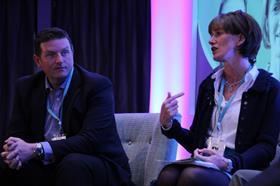
The National Living Wage, Brexit and consumption were the topics of discussion for the industry panel debate at FPJ Live, taking place today (21 April).
Worldwide Fruit chief executive Steve Maxwell, chair of the NFU’s Horticulture and Potatoes Board Ali Capper, and director of strategy at the AHDB Steve Tones joined FPJ editor Michael Barker on stage at The Belfry, in Warwickshire.
Speaking about the National Living Wage (NLW), Maxwell stressed that it is a real cost that cannot be ignored. “It’s 33p an hour more – we need to pass this on. It’s a real increase and there’s no escaping it. It has to be understood, that is going to be the biggest issue we have. It’s a real cost you can’t hide it.”
Capper said although automation is touted as a long-term solution, there are “no robotic pickers waiting in the wings”. “I haven’t got a technical solution to replace the labour. Apple packhouses are already some of the most advanced, so there isn’t a lot of labour there to replace either,” she said.
“Horticulture businesses on average see between 40 and 70 per cent of costs coming from labour – we need a per head mitigation. It’s really serious, if we can’t do anything to mitigate this then in three to four years time many horticulture businesses in the future will be non profitable. This means we will be closing down. We will be exporting production overseas.”
Tones said the fresh produce industry has responded to difficult challenges in the past, but agreed that the development of robotics is challenging in itself.
“There are some short-term responses, but for longer-term mitigation we’re looking at technology, and that is hugely challenging for available capital, confidence, and the plethora of technology available.”
Using a new interactive polling system, delegates at FPJ Live voted by smartphone to say whether they think the UK should remain or leave the European Union (EU).
Around two-thirds of the audience voted to remain.
Maxwell said he would vote to remain, but was relaxed about the impact either way. “What will be will be, I’m more worried about the weakness of the pound,” he said.
The NFU this week came out as anti-Brexit, but Capper said the union is not advising people how to vote. “The NFU position is best for UK agriculture overall, but we’re not advising people how to vote – that’s a personal decision. For horticulture within that, remain probably is the safest bet, taking into account the list of things that are wrong with the EU.
“But the biggest industry issues are often with the UK government – NLW and crop protection are all to do with UK government,' she added.
Finally, the panel also discussed who should take the lead on boosting consumption of fruit and vegetables, and how best to do this.
“In horticulture we’ve always struggled with this. The AHDB has tended to put all the levy money into crop protection, keeping ourselves alive, but we’re taking a fresh look at this,” said Tones. “In the past we thought anything we did should be based on serious academic research, such as Food Dudes scheme. But despite the huge amount of work that’s been done on 5 A DAY, the reality is that it’s gone down to three.”
Capper said the industry should look at all retail opportunities for produce. “We’re not putting fruit and veg options in front of people in all the obvious places. We’re talking about everywhere people go to grab food, and I think sometimes our industry forgets about some of these places,” she said.
Asked whether he thinks consumers would pay more for produce, Maxwell said: “We’re very wedded to particular price points nowadays. You used to see £1.09, £1.29, things like that. I think there’s a fear of raising prices, and I’m not sure it’s justified.”



